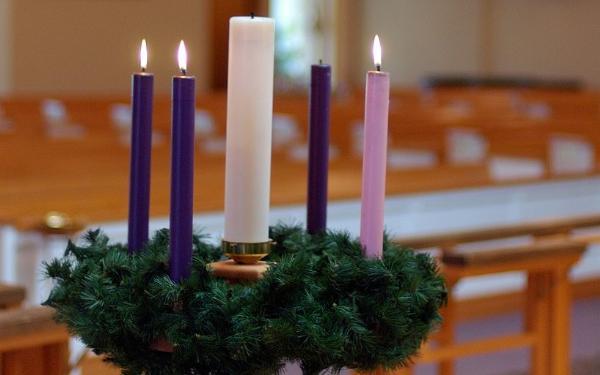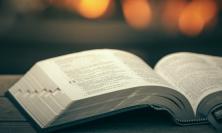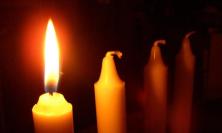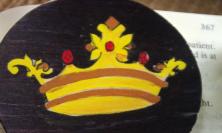‘In Advent we practise listening for Him, so that we will learn to listen to Him.’ The gospel readings of the four Sundays of Advent invite us to listen, in different ways, for the coming of Christ, writes Sr Margaret Atkins. Just as we have different modes of listening in our everyday lives, we find this reflected in the invitations to attentiveness that we hear in the Advent scriptures.
Finding stillness
There are different ways of listening. One is, very simply, to listen. You switch off the appliances, sit absolutely still, and let yourself hear all the little sounds you have forgotten about: the ticking of the clock, the thin autumn song of a robin, the beating of your own heart. You are no longer absorbed by the noise that belongs to busyness, the noise that you choose for yourself. Instead, you begin to hear what just happens to be there.
The reading from the Gospel of St Matthew for the first Sunday of Advent this year invited us just to listen. It offers a general warning: ‘Stay awake!’ In the days of Noah most people were too engrossed in the distractions of everyday life to notice what was going on, and ‘the flood came, and swept them all away.’ When the Son of Man appears, the men will be engaged in the fields; the women will be grinding corn. Will they be so wrapped up in what they are doing that they miss what is happening? (Mt 24:37-44). The first thing to do, the reading suggests, is to draw back from our busyness so that we can start just to listen.
The recent series on BBC2, The Big Silence focused on five people who wanted to find silence in order to change their stressful lives. In introducing the project, Fr Christopher Jamison called silence ‘the gateway to the soul, and the soul is the gateway to God’. For the five participants, however, the hardest thing was not to seek the soul they did not yet know, but to withdraw from the noise they already knew so well. After a weekend at Worth Abbey, Fr Christopher invited them to go back to their normal lives for a week and carry out one simple exercise: he asked them to switch off, for an hour a day, their computers, their televisions, their radios and their mobile phones. Nearly all of them failed completely. The first thing that they needed to do was to learn simply to listen.
Listening through the noise
Sometimes, instead, we listen for something specific. Then, we need to filter out the noises that obscure what we are trying to hear. In the railway station, we strain our ears to hear past the rush-hour crowds and the background traffic and catch the announcement of our train. Amid the laughter and music of a party, we struggle to receive an old friend’s news. We sift out the racket and try to grasp what is really significant.
In the gospel reading of the second Sunday of Advent, John the Baptist arrives to take our listening further: ‘Repent!’ he proclaims. He then berates the Pharisees, who here, as often in the gospels, represent self-righteousness. The listening of repentance teaches us to be honest about ourselves. We have to learn to calm the bustle of anxieties and memories and plans that invade our minds, and then to reject those inner voices of hasty self-defence, to distrust our easy indignation and our petty resentments; we have to put these aside, and wait, in the silence, until we can hear, and accept, the truth (Mt 3:1-12).
That, however, is not an easy thing to do. As The Big Silence progressed, it was striking how painful the participants found it simply to be in silence and stillness. They are not unusual: most of us can acknowledge that addictive impulse to fill the spaces by switching on the TV or reaching for the mobile phone. Even in the seventeenth-century the French Catholic philosopher Blaise Pascal had understood why. If people stop being busy, he argued,
then they would see themselves, and think about what they are, where they come from, and where they are going. That is why men cannot be too much occupied and distracted, and that is why, when they have been given so many things to do, if they have some time off they are advised to spend it on diversion and sport, and always to keep themselves fully occupied.[1]
Unless we distract ourselves, we may have to ask ourselves serious and uncomfortable questions about our lives. Philip Larkin expresses a similar thought from the point-of-view of a modern atheist, in a poem called ‘Aubade’, which brilliantly evokes the terror of waking in the early hours to face the belief that death will mean annihilation:
Most things may never happen: this one will,
And realisation of it rages out
In furnace-fear when we are caught without
People or drink.
Fortunately, the truth about ourselves is bigger than us. Those who have deliberately embraced long periods of silence regularly report that restlessness and anguish eventually give way to a joyful and intense appreciation of what is around them, and a deep sense of the harmony of things. This was the experience, in different ways, of all the participants in The Big Silence, as they lived through their week’s silent retreat at St Beuno’s. If the Christian story is true, such experiences make sense. ‘Blessed are the pure in heart, for they shall see God.’ It is through honest self-examination and repentance that we become capable of recognising the fundamental goodness of the created world, and of experiencing it as a gift. Even those who do not explicitly acknowledge God as its Giver can thus begin to exercise the gratitude, appreciation and trustfulness that brings some measure of peace.
Recognising what we hear
At other times again, we are listening out for something which we might not manage to recognise. A birdwatcher pauses to enjoy the singing from the branch above. It is loud and clear – but only half-familiar. Is it a blackcap or not? A lyrical melody floats across the room from the radio. You know it so well – a violin sonata – but is it Beethoven or Brahms? So you listen and rack your memory for the signs that reveal its identity.
In the third week of Advent, the Baptist reappears to send a question to Jesus: who are you? Jesus does not answer directly. This is what he says instead: ‘Tell John what you see and hear – the blind, the deaf, the lepers, the lame, are healed and restored to their full place in society. The poor hear good news. Prisoners are set free. Tell John all this, and let him work out for himself what it means.’
For many generations the people of Israel had been waiting for the Messiah. They had not been told exactly what he would be like. Instead, they had been told of the signs that would reveal his presence. So Jesus’s answer to John meant, ‘You know what the Scriptures tell you to look out for. You can see and hear these things before you. Notice that they are happening, and realise what they mean.’ (Mt 11:2-11) In the Gospel of John, of course, Jesus is more explicit: ‘I am the Way, the Truth, and the Life’ (Jn 14:6).
Of the participants in The Big Silence, one was, and another had been, a regular churchgoer. By the end of the series, these two had committed themselves again to their own Christian tradition. Of the other three, only one could speak explicitly of coming to believe in the presence of God. The others had found something beyond mere materialism, but they could not give it a name. In a post-Christian society, it is notable how often people who experience, in concrete ways, the goodness of God and the grace of Christ are unable to honour the source of these gifts. Parents fight to get their children into Catholic schools, because they value their ‘ethos’; yet few of them commit themselves to the faith and worship which foster that ethos. When a child dies, it is taken for granted that the ministers of the Church will be there to provide solace and comfort and a dignified requiem; yet no one asks why the Church is always there. Where the sick in less wealthy countries need healthcare, the Church is by far the biggest private provider; when earthquake or famine strikes, it is Christian charities that do most to respond. Are these merely facts, or are they signs? Do we take the care to interpret them, or help others to do the same?
With due care and attention
Finally, of course, we can listen to someone. Indeed, we seem to be doing it all the time. Isn’t that, after all, why we can’t manage to switch off the TV or the phone? Perhaps, however, we listen less than we think. When we are ‘listening to’ each other, we turn away the instant our mobile phone rings. Most of the music from the radio we are ‘listening to’, we don’t even hear. One survey of doctors revealed that they waited, on average, 23.1 seconds before interrupting a patient who was explaining a problem. I doubt that doctors are worse offenders than the rest of us: listening to, really listening to, is a skill we are rapidly forgetting.
On the fourth Sunday of Advent, we hear Matthew’s account of Joseph’s dream. He had been preparing to deal with the embarrassing problem of his fiancée’s pregnancy discreetly and decently. But clearly he wanted to wash his hands of the matter as quickly as he could. The angel’s message stopped him in his tracks. He cast aside his fear and embarrassment to welcome Mary as his wife. He embraced his role in the God-given mission of her unborn child. Joseph ‘did as the angel of the Lord commanded him’. It was as simple as that (Mt 1:18-24).
Joseph was able to listen to the angel. First of all he had to recognise his words for what they were: a message from God. Then he had to attend to them, to absorb their detail. Then, most difficult of all, he had to take what was said into his heart, and to act upon it. Joseph, St Matthew tells us, was a just man. His justice turned out to be more than mere respectability. His faithfulness to God had enabled him to become the kind of person who could truly listen – who could hear and recognise, could understand and obey.
All serious listening needs silence. The purpose of a regular practice of silence is not simply to listen, but to become a good listener. The silence of stillness calms us, so that we can begin to hear more profoundly. The silence of repentance liberates us to welcome the truth. The silence of expectation prepares us to recognise the voice that deserves our total attention. The Christmas story identifies that voice as the voice of Christ. In Advent we practise listening for Him, so that we will learn to listen to Him. The Word through whom all things were made became human flesh. In listening to that Word, in rediscovering the peace that he brings, we might renew all our listening. Out of our silence, we can then listen, truly listen, with fresh delight and sympathy, to the birds He has created, to the music that celebrates His world, to the human beings that are made in His image; we can listen, and we can hear them as we have not heard them before.
And the end of all our exploring
Will be to arrive where we started
And know the place for the first time.[2]
Sr Margaret Atkins is a member of the Augustinian community at Boarbank Hall in Cumbria. She organises a residential holiday and study week there in July, also called Thinking Faith, for Catholic students and young professionals. For more see: www.boarbankhall.org.uk under ‘Events’.
[1] Pascal, Pensées, translated by A.J. Krailsheimer (Penguin1966), no. 139, p.72.
[2] T.S. Eliot, ‘Little Gidding’.






